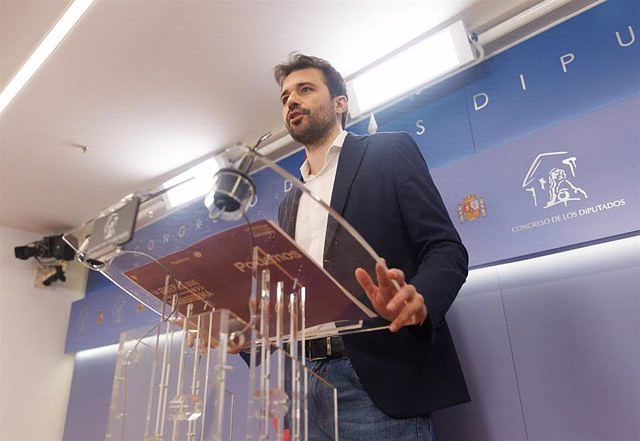He criticizes the "terrible image" of the PSOE and PP alliance on the eve of 8M and affirms that the entire group will vote against it if there is no pact
MADRID, 7 Mar. (EUROPA PRESS) -
The state co-spokesperson for Podemos, Javier Sánchez Serna, has blamed the PSOE for the "serious" situation within the coalition and for promoting the breakup of the progressive majority in Congress with its "counter-reform" of the Law 'only yes is yes' . He has even proclaimed that they are the part of the Government that defends the claims of feminism and, consequently, it is not Equality or its head, Irene Montero, who must resign due to this controversy.
This has been transferred at a press conference in Congress to place the responsibility for this internal crisis on the socialist wing, which he has urged to rectify, prevent his plan to reformulate the regulations from being supported by the PP and Vox and rebuild the consensus with their parliamentary allies.
Therefore, he has stated that they will hold out their hand until the "last minute" with a view to reaching an agreement, but that his confederal group as a whole has decided to vote against if his partner persists in continuing unilaterally with his proposal, which in his opinion displaces consent as the center of the law.
During his appearance, the leader of the purple formation has admitted that the deep discrepancy with his fellow Executive and that everything indicates that today, during the debate on the consideration of the PSOE reform initiative, may be a "sad day". for the rights of women in the country.
In this way, he has asked the PSOE if the socialist bench will join the foreseeable celebration and applause from PP and Vox when they add a majority to reformulate the Law of 'only yes is yes'. Thus, he has denounced that this drift is "nonsense" and an "absurd situation" that they are trying to avoid so that a "terrible image" is not given on the eve of 8M, international women's day.
The also first secretary of the Bureau of Congress has indicated that these days he is considering whether United We Can be "at ease" in the Government with the PSOE, to answer that the controversy over the changes in the yes does justify the need to continue in the Government, because it is precisely they who vigorously defend the rights of women and the trans collective.
In fact, it has launched that precisely its formation is the part of the Government that defends and takes to the Official State Gazette (BOE) the claims of feminism. "That part of the Government cannot resign because it is with feminism and 8-M", he has deepened to return to demand that the PSOE agree to negotiate and rectify its position of taking its initiative even with the "right and the extreme right".
Sources of the formation highlight a closed support for Irene Montero, given that in this controversy consistency was demonstrated by defending the text approved within the Government itself, together with its willingness to negotiate a change despite the fact that, as the PSOE itself admits, it will not prevent sentencing reviews of sex offenders from continuing.
And it is that Sánchez Serna has indicated that the problem of the regulations simply lies in a "minority" sector of the judiciary, which applies the law "badly", which is not the first time that "attacks" have taken place against feminist advances and He has criticized that the PSOE "holds badly" the pressure from the right, and even a conservative sector within the Socialists.
Given the imminent vote, he has expressed pessimism about a last-minute agreement because in these months of negotiation the PSOE has ruled out up to seven Equality proposals, which have never risen from the negotiating table, to change the law and they fear that the PSOE It will align itself with PP and Vox, which implies a drift of "important gravity" that will have to make them reflect.
For his part, the president of the confederal group and leader of En Comú Podem, Jaume Asens, has also criticized the attitude of the PSOE and that it is impossible to reach an agreement with "only one of the parties sitting at the table." What's more, he has accused the Socialists of making a "mistake" and turning their "back" not only on their partner but also on the investiture bloc.
However, Asens has been more conciliatory than his fellow bench and believes that there is "room for manoeuvre" for the agreement in the months of parliamentary processing of the PSOE reform, maintaining that the positions "are not so far apart."
In fact, it has lowered the repercussions on the admission of the socialist initiative, admitting that it is a "bump" between partners but "it is not the end of the world."
A similar criterion is held by the deputy of the group and third vice president of Congress, Gloria Elizo, who also thinks, as she has told the media, that the processing phase is an opportunity to try to reach a consensus with the PSOE.
However, sources from the purple formation have replicated that the possibility of an agreement during the amendment period is complicated, since nothing guarantees that the PSOE will change its position and negotiate with its partner when it already has the support of the right.
Despite everything, Asens has criticized the real possibility that the PSOE, due to a clear "electoral" desire before the 28-M elections, will carry out its proposal with PP and Vox, who have opposed advances such as the Trans Law, the abortion reform or "mock" the LGTBi collective, as in the case of the president of the Community of Madrid Isabel Díaz Ayuso.
On the other hand, he has affirmed that the data from the review of sentences maintains that only 25% end in reductions and that only a minority of the judiciary deviates from the meaning of the law, in addition to pointing out that the Prosecutor's Office is appealing those resolutions and that the number of sentence reductions can be "significantly reduced" when the Supreme Court rules.
Therefore, Asens has emphasized that "hurrying is not good" when it comes to taking stock of the law, nor is it positive to carry out a "hot reform", although he admits that there are "unwanted" effects that have caused social alarm. However, he is in favor of evaluating the law not based on whether the sentences have been reduced, but based on whether there have been more complaints and whether women are more protected, which is the main objective of the law.
In fact, he has commented that Spain has one of the most severe penal codes at the international level in terms of sexual assault and that women "will not feel more protected if the convicted are released two or three months later", but rather enabling more psychologists and avoid the "evidence ordeal" during the process. Thus, he has criticized the occurrence of a "punitive populism" with the "erroneous" belief that the greater the sentence, the less crime, something that is refuted, for example, based on the crime rates that the United States presents, for example.

 Exploring Cardano: Inner Workings and Advantages of this Cryptocurrency
Exploring Cardano: Inner Workings and Advantages of this Cryptocurrency Seville.- Economy.- Innova.- STSA inaugurates its new painting and sealing hangar in San Pablo, for 18 million
Seville.- Economy.- Innova.- STSA inaugurates its new painting and sealing hangar in San Pablo, for 18 million Innova.- More than 300 volunteers join the Andalucía Compromiso Digital network in one month to facilitate access to ICT
Innova.- More than 300 volunteers join the Andalucía Compromiso Digital network in one month to facilitate access to ICT Innova.-AMP.- Ayesa acquires 51% of Sadiel, which will create new technological engineering products and expand markets
Innova.-AMP.- Ayesa acquires 51% of Sadiel, which will create new technological engineering products and expand markets COMUNICADO: Energy Transitions Commission (ETC) Urges Government and Industry Collaboration to Overcome Perceptions of Offshore Wind
COMUNICADO: Energy Transitions Commission (ETC) Urges Government and Industry Collaboration to Overcome Perceptions of Offshore Wind UGT and CCOO demand the regeneration of democracy, better salaries and a reduction in working hours
UGT and CCOO demand the regeneration of democracy, better salaries and a reduction in working hours Alcaraz gives up his reign in Madrid against Rublev
Alcaraz gives up his reign in Madrid against Rublev Petro announces that Colombia will break diplomatic relations with Israel
Petro announces that Colombia will break diplomatic relations with Israel How Blockchain in being used to shape the future
How Blockchain in being used to shape the future Not just BTC and ETH: Here Are Some More Interesting Coins Worth Focusing on
Not just BTC and ETH: Here Are Some More Interesting Coins Worth Focusing on Ivace and promotes a less invasive device for the early detection of prostate cancer
Ivace and promotes a less invasive device for the early detection of prostate cancer Valencia unanimously approves the ordinance to allocate spaces to test innovative initiatives
Valencia unanimously approves the ordinance to allocate spaces to test innovative initiatives UPV researchers promote a paid master's degree as a "talent factory" in integrated photonics
UPV researchers promote a paid master's degree as a "talent factory" in integrated photonics A spin-off of the UV works on obtaining high-resolution 3D biomedical images in real time
A spin-off of the UV works on obtaining high-resolution 3D biomedical images in real time A million people demonstrate in France against Macron's pension reform
A million people demonstrate in France against Macron's pension reform Russia launches several missiles against "critical infrastructure" in the city of Zaporizhia
Russia launches several missiles against "critical infrastructure" in the city of Zaporizhia A "procession" remembers the dead of the Calabria shipwreck as bodies continue to wash up on the shore
A "procession" remembers the dead of the Calabria shipwreck as bodies continue to wash up on the shore Prison sentences handed down for three prominent Hong Kong pro-democracy activists
Prison sentences handed down for three prominent Hong Kong pro-democracy activists ETH continues to leave trading platforms, Ethereum balance on exchanges lowest in 3 years
ETH continues to leave trading platforms, Ethereum balance on exchanges lowest in 3 years Investors invest $450 million in Consensys, Ethereum incubator now valued at $7 billion
Investors invest $450 million in Consensys, Ethereum incubator now valued at $7 billion Alchemy Integrates Ethereum L2 Product Starknet to Enhance Web3 Scalability at a Price 100x Lower Than L1 Fees
Alchemy Integrates Ethereum L2 Product Starknet to Enhance Web3 Scalability at a Price 100x Lower Than L1 Fees Mining Report: Bitcoin's Electricity Consumption Declines by 25% in Q1 2022
Mining Report: Bitcoin's Electricity Consumption Declines by 25% in Q1 2022 Oil-to-Bitcoin Mining Firm Crusoe Energy Systems Raised $505 Million
Oil-to-Bitcoin Mining Firm Crusoe Energy Systems Raised $505 Million Microbt reveals the latest Bitcoin mining rigs -- Machines produce up to 126 TH/s with custom 5nm chip design
Microbt reveals the latest Bitcoin mining rigs -- Machines produce up to 126 TH/s with custom 5nm chip design Bitcoin's Mining Difficulty Hits a Lifetime High, With More Than 90% of BTC Supply Issued
Bitcoin's Mining Difficulty Hits a Lifetime High, With More Than 90% of BTC Supply Issued The Biggest Movers are Near, EOS, and RUNE during Friday's Selloff
The Biggest Movers are Near, EOS, and RUNE during Friday's Selloff Global Markets Spooked by a Hawkish Fed and Covid, Stocks and Crypto Gain After Musk Buys Twitter
Global Markets Spooked by a Hawkish Fed and Covid, Stocks and Crypto Gain After Musk Buys Twitter Bitso to offset carbon emissions from the Trading Platform's ERC20, ETH, and BTC Transactions
Bitso to offset carbon emissions from the Trading Platform's ERC20, ETH, and BTC Transactions Draftkings Announces 2022 College Hoops NFT Selection for March Madness
Draftkings Announces 2022 College Hoops NFT Selection for March Madness



























